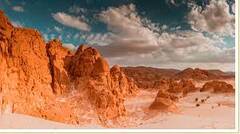In the Desert: Again. Parshat BaMidbar
05/14/2023 07:02:22 PM

In Numbers, the fourth book of the Torah, we join the Jewish people on their journey through the howling wilderness on our way to the Promised Land. We encounter moments of joy and challenges of rebellion and disaster. But through it all, though long delayed, G-d’s purpose of bringing us to our inheritance in the Land of Israel is fulfilled. What does this book, these stories mean to our lives? We believe they can serve as a guide and source of insight, inspiration and hope. The Hebrew name for the book is BaMidbar which means: “In the Desert.”
The Torah’s odyssey of the rise of our people from the debasement of slavery through the ordeals of the desert and finally home to our own land describes not just a national saga but each of our individual stories as well.
To see our story within the Jewish story- rising from darkness to light, from slavery to freedom, from the physical to the spiritual is perhaps part of Rabban Gamliel’s teaching in the Passover Haggadah: In every generation each of us in obligated to see themselves as if each one of us went out of Egypt.
I don’t personally remember going through what the Torah calls the Iron Furnace of slavery: building Egyptian supply cities or seeing the Nile turn to blood, but just being human in general and Jewish in particular is filled with its own share of trial and tragedy. Struggle and hardship and even trauma are part of the human condition.
But the ordeals and suffering we each go through are not part of an ascent to some Exodus experience and do not culminate in a Mount Sinai moment, do they?
Unless- unless…
Unless we use the supreme human power of intention. It was in Auschwitz when Viennese psychoanalyst Viktor Frankl discovered that all human freedoms could be taken away: except for one: the power to choose our attitude.
In Auschwitz, Frankl lost everything. But what could not be taken from him was his response to life. In that place of death and degradation, Frankl and others held onto hope, purpose and meaning. For Frankl, thinking about his love for his wife, hoping for the day they could again be together helped sustain him. And as time passed, he discovered that filling his heart with thoughts of love and hope taught him something else: that having a mission, having a meaning, made all the difference. His mission became the goal of sharing this life changing insight and the book that he wrote, Man in Search of Meaning, and the school of psychotherapy he founded, Logotherapy, have inspired humanity ever since.
So when we read the stories of the Torah, let us use this superpower of intention. We are more than our experiences and more than our personal narratives. We are on our own desert journeys. Some of the way stations are places of trial and refiner’s fire. Some of them are places of peace and respite. But we can see them all as stages of ascent. There are lessons to be learned, blessings to be torn out of the talons of tragedy. When we see ourselves and our lives not as a self-contained, isolated episode, a single candle burning in the darkness, but as a part of a great scroll of light that continues and builds and unfolds, the numinous narrative of the Covenant People, of Am Yisrael, each of us seeking to add blessing in our way, then perhaps we can become aware of a world of light and love hidden in even the most difficult desert journeys. Shabbat Shalom-
